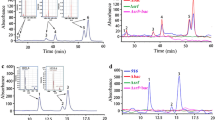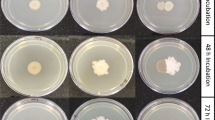Abstract
In this work, the behavior in tomato rhizosphere of Bacillus velezensis FZB42 was analyzed taking into account the surfactin production, the use of tomato roots exudate as substrates, and the biofilm formation. B. velezensis FZB42 and B. amyloliquefaciens S499 have a similar capability to colonize tomato rhizosphere. Little difference in this colonization was observed with surfactin non producing B. velezensis FZB42 mutant strains. B. velezensis is able to grow in the presence of root exudate and used preferentially sucrose, maltose, glutamic, and malic acids as carbon sources. A mutant enable to produce exopolysaccharide (EPS-) was constructed to demonstrate the main importance of biofilm formation on rhizosphere colonization. This mutant had completely lost its ability to form biofilm whatever the substrate present in the culture medium and was unable to efficiently colonize tomato rhizosphere.






Similar content being viewed by others
References
Allison DG, Sutherland IW (1987) The role of exopolysaccharides in adhesion of freshwater bacteria. J Gen Microbiol 133:1319–1327. https://doi.org/10.1099/00221287-133-5-1319
Badri DV, Vivanco JM (2009) Regulation and function of root exudates. Plant Cell Environ 32:666–681. https://doi.org/10.1111/j.1365-3040.2009.01926.x
Bais HP, Fall R, Vivanco JM (2004) Biocontrol of Bacillus subtilis against infection of Arabidopsis roots by Pseudomonas syringae is facilitated by biofilm formation and surfactin production. Plant Physiol 134:307–319. https://doi.org/10.1104/pp.103.028712
Bertin C, Yang X, Weston LA (2003) The role of root exudates and allelochemicals in the rhizosphere. Plant Soil 256:67–83. https://doi.org/10.1023/A:1026290508166
Budiharjo A, Chowdhury SP, Dietel K, Beator B, Dolgova O, Fan B, Bleiss W, Ziegler J, Schmid M, Hartman A, Borriss R (2014) Transposon mutagenesis of the plant-associated Bacillus amyloliquefaciens ssp. plantarum FZB42 revealed that the nfrA and RBAM17410 genes are involved in plant- microbe-interactions. PLoS One 9(5):e98267. https://doi.org/10.1371/journal.pone.0098267
Cao G, Zhang X, Zhong L, Lu Z (2011) A modified electro-transformation method for Bacillus subtilis and its application in the production of antimicrobial lipopeptides. Biotechnol Lett 33:1047–1051. https://doi.org/10.1007/s10529-011-0531-x
Chen XH, Koumoutsi1 A, Scholz R, Eisenreich1 A, Schneider K, Heinemeyer I, Morgenstern B, Voss B, Hess WR, Reva O, Junge H, Voigt B, Jungblut PR, Vater J, Sussmuth R, Liesegang H, Strittmatter A, Gottschalk G, Borriss R (2007) Comparative analysis of the complete genome sequence of the plant growth-promoting bacterium Bacillus amyloliquefaciens FZB42. Nat Biotechnol (9):1007–1014. https://doi.org/10.1038/nbt1325
Choudhary DK, Johri BN (2009) Interactions of Bacillus spp. and plants with special reference to induced systemic resistance (ISR). Microbiol Res 164:493–513. https://doi.org/10.1016/j.micres.2008.08.007
Das BB, Dkhar MS (2011) Rhizosphere microbial populations and physico chemical properties as affected by organic and inorganic farming practices. Am Eur J Agric Environ Sci 10:140–150
Davey ME, Caiazza NC, O'Toole GA (2003) Rhamnolipid surfactant production affects biofilm architecture in Pseudomonas aeruginosa PAO1. J Bacteriol 185:1027–1036. https://doi.org/10.1128/JB.185.3.1027-1036.2003
Deravel J, Lemiere S, Coutte F, Krier F, Van Hese N, Bechet M, Jacques P (2014) Mycosubtilin and surfactin are efficient, low ecotoxicity molecules for the biocontrol of lettuce downy mildew. Appl Microbiol Biotechnol 98:6255–6264. https://doi.org/10.1007/s00253-014-5663-1
Dietel K, Beator B, Budiharjo A, Fan B, Borris R (2013) Bacterial traits involved in colonization of Arabidopsis thaliana roots by Bacillus amyloliquefaciens FZB42. Plant Pathol J 29:59–66. https://doi.org/10.5423/PPJ.OA.10.2012.0155
Donlan RM, Costerton JW (2002) Biofilms: survival mechanisms of clinically relevant microorganisms. Clin Microbiol Rev 15:167–193. https://doi.org/10.1128/CMR.15.2.167-193.2002
Emmert EA, Handelsman J (1999) Biocontrol of plant disease: a Gram-positive perspective. FEMS Microbiol Lett 171:1–9. https://doi.org/10.1111/j.1574-6968.1999.tb13405.x
Fan B, Chen XH, Budiharjo A, Bleiss W, Vater J, Borriss R (2011) Efficient colonization of plant roots by the plant growth promoting bacterium Bacillus amyloliquefaciens FZB42, engineered to express green fluorescent protein. J Biotechnol 151:303–311. https://doi.org/10.1016/j.jbiotec.2010.12.022
Fan B, Carvalhais LC, Becker A, Fedoseyenko D, von Wirén N, Borriss R (2012) Transcriptomic profiling of Bacillus amyloliquefaciens FZB42 in response to maize root exudates. BMC Microbiol 12:116. https://doi.org/10.1186/1471-2180-12-116
Fan B, Blom J, Klenk HP, Borriss R (2017) Bacillus amyloliquefaciens, Bacillus velezensis, and Bacillus siamensis form an “operational group B. amyloliquefaciens” within the B. subtilis species complex. Front Microbiol 8:22. https://doi.org/10.3389/fmicb.2017.00022
Fang W, Hu JY, Ong SL (2009) Influence of phosphorus on biofilm formation in model drinking water distribution systems. J Appl Microbiol 106:1328–1335. https://doi.org/10.1111/j.1365-2672.2008.04099.x
Farace G, Fernandez O, Jacquens L, Coutte F, Krier F, Jacques P, Clément C, Ait Barka E, Jacquard C, Dorey S (2015) Cyclic lipopeptides from Bacillus subtilis activate distinct patterns of defence responses in grapevine. Mol Plant Pathol 16(2):177–187. https://doi.org/10.1111/mpp.12170
Flemming HC, Wingender J (2010) The biofilm matrix. Nat Rev Microbiol 8:623–633. https://doi.org/10.1038/nrmicro2415
Flemming HC, Neu TR, Wozniak DJ (2007) The EPS matrix: the “house of biofilm cells”. J Bacteriol 189:7945–7947. https://doi.org/10.1128/JB.00858-07
Garcia-Gutierrez L, Zeriouh H, Romero D, Cubero J, Vicente A, Perez-Garcia A (2013) The antagonistic strain Bacillus subtilis UMAF6639 also confers protection to melon plants against cucurbit powdery mildew by activation of jasmonate-and salicylic acid-dependent defence responses. Microb Biotechnol 6:264–274. https://doi.org/10.1111/1751-7915.12028
Glick BR (2012) Plant growth-promoting bacteria: mechanisms and applications. Scientifica:1–15. https://doi.org/10.6064/2012/963401
Hsueh YH, Somers EB, Lereclus D, Wong ACL (2006) Biofilm formation by Bacillus cereus is influenced by PlcR, a pleiotropic regulator. Appl Environ Microbiol 72:5089–5092. https://doi.org/10.1128/AEM.00573-06
Idris EE, Makarewicz O, Farouk A, Rosner K, Greiner R, Bochow H, Borriss R (2002) Extracellular phytase activity of Bacillus amyloliquefaciens FZB45 contributes to its plant-growth-promoting effect. Microbiology 148:2097–2109. https://doi.org/10.1099/00221287-148-7-2097
Idris EE, Bochow H, Ross H, Borriss R (2004) Use of Bacillus subtilis as biocontrol agent. VI. Phytohormone-like action of culture filtrates prepared from plant growth-promoting Bacillus amyloliquefaciens FZB24, FZB42, FZB45 and Bacillus. Z Pflanzenkrankh Pflanzenschutz 111:583–597. https://doi.org/10.1111/j.1574-6968.1999.tb13405.x
Jacques P, Hbid C, Destain J, Razafindralambo H, Paquot M, De Pauw E and Thonart P (1999) Optimization of biosurfactant lipopeptide production from Bacillus subtilis S499 by Plackett-Burman design. In Twentieth Symposium on Biotechnology for Fuels and Chemicals. Humana Press, pp 223–233
Julkowska D, Obuchowski M, Holland IB, Séror SJ (2004) Branched swarming patterns on a synthetic medium formed by wild-type Bacillus subtilis strain 3610: detection of different cellular morphologies and constellations of cells as the complex architecture develops. Microbiology 150:1839–1849. https://doi.org/10.1099/mic.0.27061-0
Kloepper JW, Ryu CM, Zhang S (2004) Induced systemic resistance and promotion of plant growth by Bacillus spp. Phytopathology 94:1259–1266. https://doi.org/10.1094/PHYTO.2004.94.11.1259
Kohler J, Caravaca F, Carrasco L, Roldan A (2007) Interactions between a plant growth-promoting rhizobacterium, an AM fungus and a phosphate-solubilizing fungus in the rhizosphere of Lactuca sativa. Appl Soil Ecol 35:480–487. https://doi.org/10.1016/j.apsoil.2006.10.006
Koumoutsi A, Chen XH, Henne A, Liesegang H, Hitzeroth G, Franke P, Vater J, Borris R (2004) Structural and functional characterization of gene clusters directing nonribosomal synthesis of bioactive cyclic lipopeptides in Bacillus amyloliquefaciens strain FZB42. J Bacteriol 186:1084–1096. https://doi.org/10.1128/JB.186.4.1084-1096.2004
Leclerc H (2003) Relationships between common water bacteria and pathogens in drinking-water. Heterotrophic Plate Counts and Drinking-water Safety. IWA Publishing, London, pp 80–118
Leclere V, Marti R, Béchet M, Fickers P, Jacques P (2006) The lipopeptides mycosubtilin and surfactin enhance spreading of Bacillus subtilis strains by their surface active properties. Arch Microbiol 186:475–483. https://doi.org/10.1007/s00203-006-0163-z
Ling N, Raza W, Ma J, Huang Q, Shen Q (2011) Identification and role of organic acids in watermelon root exudates for recruiting Paenibacillus polymyxa SQR-21 in the rhizosphere. Europ J Soil Biol 47:374–379. https://doi.org/10.1016/j.ejsobi.2011.08.009
Lugtenberg B, Kamilova F (2009) Plant-growth-promoting rhizobacteria. Annu Rev Microbiol 63:541–556. https://doi.org/10.1146/annurev.micro.62.081307.162918
Maget-Dana R, Thimon L, Peypoux F, Ptak M (1992) Surfactin/iturin A interactions may explain the synergistic effect of surfactin on the biological properties of iturin A. Biochimie 74:1047–1051. https://doi.org/10.1016/0300-9084(92)90002-V
Makarewicz O, Dubrac S, Msadek T, Borriss R (2006) Dual role of the PhoP∼P response regulator: Bacillus amyloliquefaciens FZB45 phytase gene transcription is directed by positive and negative interactions with the phyC promoter. J Bacteriol 188:6953–6965. https://doi.org/10.1128/JB.00681-06
Mayer C, Moritz R, Kirschner C, Borchard W, Maibaum R, Wingender J, Flemming HC (1999) The role of intermolecular interactions: studies on model systems for bacterial biofilms. Int J Biol Macromol 26:3–16. https://doi.org/10.1016/S0141-8130(99)00057-4
Molinatto G, Puopoloa G, Sonego P, Moretto M, Engelen K, Viti C, Ongena M, Pertota I (2016) Complete genome sequence of Bacillus amyloliquefaciens subsp. plantarum S499, a rhizobacterium that triggers plant defences and inhibits fungal phytopathogens. J Biotechnol 238:56–59. https://doi.org/10.1016/j.jbiotec.2016.09.013
Nongkhlaw FMW, Joshi SR (2014) Distribution pattern analysis of epiphytic bacteria on ethnomedicinal plant surfaces: a micrographical and molecular approach. J Microscopy Ultrastructure 2:34–40. https://doi.org/10.1016/j.jmau.2014.02.003
Ongena M, Jacques P (2008) Bacillus lipopeptides: versatile weapons for plant disease biocontrol. Trends Microbiol 16:115–125. https://doi.org/10.1016/j.tim.2007.12.009
Ongena M, Jourdan E, Adam A, Paquot M, Brans A, Joris B, Thonart P (2007) Surfactin and fengycin lipopeptides of Bacillus subtilis as elicitors of induced systemic resistance in plants. Environ Microbiol 9:1084–1090. https://doi.org/10.1111/j.1462-2920.2006.01202.x
Pii Y, Mimmo T, Tomasi N, Terzano R, Cesco S, Crecchio C (2015) Microbial interactions in the rhizosphere: beneficial influences of plant growth-promoting rhizobacteria on nutrient acquisition process. A review. Biol Fertil Soils 51:403–415. https://doi.org/10.1007/s00374-015-0996-1
Ramey BE, Koutsoudi M, von Bodman SB, Fuqua C (2004) Biofilm formation in plant–microbe associations. Curr Opin Microbiol 7:602–609. https://doi.org/10.1016/j.mib.2004.10.014
Rudrappa T, Quinn WJ, Stanley-Wall NR, Bais HP (2007) A degradation product of the salicylic acid pathway triggers oxidative stress resulting in down-regulation of Bacillus subtilis biofilm formation on Arabidopsis thaliana roots. Planta 226:283–297. https://doi.org/10.1007/s00425-007-0480-8
Saharan BS, Nehra V (2011) Plant growth promoting rhizobacteria: a critical review. Life Sci Med Res 21:1–30
Scholz R, Vater J, Budiharjo A, Wang Z, He Y, Dietel K, Borriss R (2014) Amylocyclicin, a novel circular bacteriocin produced by Bacillus amyloliquefaciens FZB42. J Bacteriol 196:1842–1852. https://doi.org/10.1128/JB.01474-14
Sutherland IW (2001) Biofilm exopolysaccharides: a strong and sticky framework. Microbiology 147:3–9. https://doi.org/10.1099/00221287-147-1-3
Swiecilo A, Zych-Wezyk I (2013) Bacterial stress response as an adaptation to life in a soil environment. Pol J Environ Stud 6:1577–1587
Tan S, Yang C, Mei X, Shen S, Raza W, Shen Q, Xu Y (2013) The effect of organic acids from tomato root exudates on rhizosphere colonization of Bacillus amyloliquefaciens T-5. Appl Soil Ecol 64:15–22. https://doi.org/10.1016/j.apsoil.2012.10.011
Van Loon LC, Bakker PAHM (2005) Induced systemic resistance as a mechanism of disease suppression by rhizobacteria. In: PGPR: biocontrol and biofertilization. Springer, Netherlands, pp 39–66
Vancura V, Hanzlikova A (1972) Root exudates of plants: IV. Differences in chemical composition of seed and seedlings exudates. Plant Soil 36:271–282
Vancura V, Hovadik A (1965) Root exudates of plants: II. Composition of root exudates of some vegetables. Plant Soil 22:21–32
Vessey JK (2003) Plant growth promoting rhizobacteria as biofertilizers. Plant Soil 255:571–586. https://doi.org/10.1023/A:1026037216893
Watnick PI, Kolter R (1999) Steps in the development of a Vibrio cholerae El Tor biofilm. Mol Microbiol 34:586–595. https://doi.org/10.1046/j.1365-2958.1999.01624.x
Weller DM, Raaijmakers JM, Gardener BBM, Thomashow LS (2002) Microbial populations responsible for specific soil suppressiveness to plant pathogens 1. Annu Rev Phytopathol 40:309–348. https://doi.org/10.1146/annurev.phyto.40.030402.110010
Zhang GQ, Bao P, Zhang Y, Deng AH, Chen N, Wen TY (2011) Enhancing electro-transformation competency of recalcitrant Bacillus amyloliquefaciens by combining cell-wall weakening and cell-membrane fluidity disturbing. Anal Biochem 409:130–137. https://doi.org/10.1016/j.ab.2010.10.013
Acknowledgements
The authors thank Dr. Rainer Borriss for kindly providing the Bacillus velezensis strains.
Funding
This work was supported by the University of Lille 1 Sciences and Technologies, the European Funds of INTERREG IV PhytoBio Project and of INTERREG V Smartbiocontrol portfolio, BioProd project and the CPER FEDER project ALIBIOTECH. The authors thank the REALCAT platform for the use of BioLector in this work. The REALCAT platform is benefiting from a state subsidy administrated by the French National Research Agency (ANR) within the frame of the ‘Future Investments’ program (PIA), with the contractual reference ‘ANR-11-EQPX-0037’. The European Union, through the ERDF funding administered by the Hauts-de-France Region, has co-financed the platform. Centrale Lille, the CNRS, and Lille 1 University as well as the Centrale Initiatives Foundation, are thanked for their financial contributions to the acquisition and implementation of the equipment of the REALCAT platform. Ameen Al-Ali was a recipient of PhD scholarship awarded by Campus France through joint French-Iraqi governments program.
Author information
Authors and Affiliations
Corresponding author
Additional information
Responsible editor: Philippe Garrigues
Rights and permissions
About this article
Cite this article
Al-Ali, A., Deravel, J., Krier, F. et al. Biofilm formation is determinant in tomato rhizosphere colonization by Bacillus velezensis FZB42. Environ Sci Pollut Res 25, 29910–29920 (2018). https://doi.org/10.1007/s11356-017-0469-1
Received:
Accepted:
Published:
Issue Date:
DOI: https://doi.org/10.1007/s11356-017-0469-1




